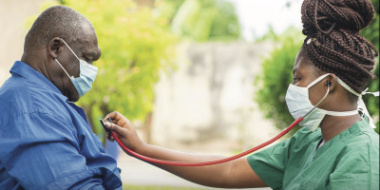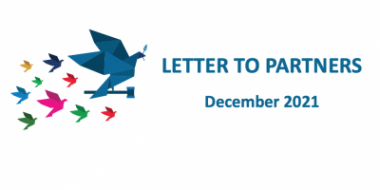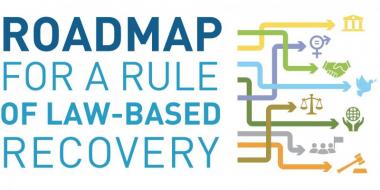Covid-19

IDLO firmly believes that good governance and the rule of law is central to managing the COVID-19 crisis and promoting recovery in all countries. Like all other parts of public life, the administration of justice and access to legal remedies and dispute resolution have been severely disrupted by the COVID-19 pandemic. The capacities of legal systems even in the most developed countries have been affected, with courts in some places slowing their ability to process cases or even shutting down. Countries and communities around the world in situations of conflict or fragility are particularly vulnerable to the social stresses being brought by the pandemic and must be supported to develop stronger governance systems including justice sector institutions through locally owned and context specific interventions.
As it continues to implement rule of law and justice programs, IDLO is guided by the 2030 Agenda for Sustainable Development – particularly Sustainable Development Goal 16 as an enabler of peace, justice, inclusion, and all of the other SDGs – in its response to the pandemic and will adapt interventions accordingly. Efforts will focus on the importance of effective public health law frameworks, the need to ensure protection of the most vulnerable members of society, and promoting a just, sustainable and equitable recovery.
Justice for Women and Girls: Moving from Commitment to Action Amidst COVID-19
WEBINAR | 23 October 2020 | 14:00 – 15:30 Rome | 8:00 – 9:30
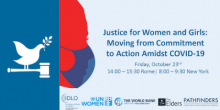
Access to Justice in the Context of COVID-19 in East Africa
REGIONAL WEBINAR
Access to Justice in the Context of COVID-19 in East Africa: Experiences from Kenya, Uganda, Tanzania and Rwanda
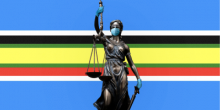
Video Statement by the Director-General Jan Beagle, at the High-level Meeting on Accelerating Gender Equality 25 Years after the Beijing Conference
Statement by the Director-General, Jan Beagle at the High-level Meeting on Accelerating Gender Equality 25 Years after the Beijing Conference
Excellencies,
I appreciate this opportunity to contribute to the discussions at this High-level Meeting on Accelerating Gender Equality 25 years after Beijing.
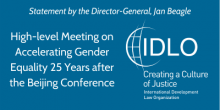
Manual for women’s shelters in Tunisia becomes law
Tunisia adopted its first national procedure manual for women’s shelters, as a result of IDLO’s program to enhance women’s protection against gender-based violence. This work was made possible by funding from the Government of Italy.

Statement by the Director-General, Jan Beagle at the Friends of the UN Task Force on the Prevention and Control of Non-Communicable Diseases
Statement by the Director-General, Jan Beagle at the Friends of the UN Task Force on the Prevention and Control of Non-Communicable Diseases: Working with Member States to Deliver the NCD-related SDG Targets during and beyond COVID-19
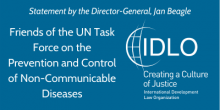
Statement by the Director-General, Jan Beagle, Annual Ministerial Meeting of Foreign Ministers of Landlocked Developing Countries
Your Excellency Mr. Mukhtar Tileuberdi, Global Chair of the Group of the Landlocked Developing Countries,
Mme. Under Secretary-General, Fekitamoeloa Katoa ‘Utoikamanu, High Representative for the Least Developed Countries, Landlocked Developing Countries and Small Island Developing States,
Distinguished delegates,
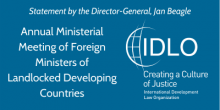
Statement to Commemorate the 75th Anniversary of the United Nations by the Director-General of IDLO, Jan Beagle
Mr. President, Mr. Secretary-General,
Distinguished representatives of Member States and Observers,
Colleagues and Friends,
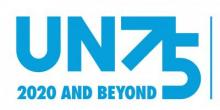
Statement by the Director-General of IDLO, Jan Beagle, on Democracy Day
COVID-19 is exposing existing fragilities to democracy, good governance and the rule of law. Citizens’ growing distrust of government has been exacerbated by the pandemic and has also limited swift and effective governance responses.
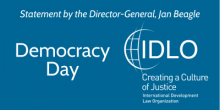
Pages
Key Initiatives
-
 Funded by the Delegation of the European Union to Mongolia, the “Child Protection Enhancement Project” (CPEP) builds on the results of its first phase of COVID-19 response programming addressing child access to justice in Mongolia. CPEP works to enhance the child protection system and support Mongolian children by building the technical and professional skills of Legal Committees for Child Rights (LCCRs) through mentorship and advanced training.
Funded by the Delegation of the European Union to Mongolia, the “Child Protection Enhancement Project” (CPEP) builds on the results of its first phase of COVID-19 response programming addressing child access to justice in Mongolia. CPEP works to enhance the child protection system and support Mongolian children by building the technical and professional skills of Legal Committees for Child Rights (LCCRs) through mentorship and advanced training. -
 The COVID-19 pandemic and efforts to contain it have had severe and long-lasting impacts on Mongolia. Though prevention and containment measures have successfully prevented a large-scale health crisis, extended lockdowns have negatively affected children’s access to education, psychological and physical wellbeing and reduced the capacity of the Mongolian justice system to respond to crimes against children.
The COVID-19 pandemic and efforts to contain it have had severe and long-lasting impacts on Mongolia. Though prevention and containment measures have successfully prevented a large-scale health crisis, extended lockdowns have negatively affected children’s access to education, psychological and physical wellbeing and reduced the capacity of the Mongolian justice system to respond to crimes against children. -
 Sound legal and policy frameworks are key enablers in ensuring effective prevention, detection, and response to Public Health Emergencies of International Concern and other public health risks. The International Health Regulations, developed in 2005, is a legally binding instrument requiring States to develop core capacities for rapid detection of and response to public health emergencies such as COVID-19.
Sound legal and policy frameworks are key enablers in ensuring effective prevention, detection, and response to Public Health Emergencies of International Concern and other public health risks. The International Health Regulations, developed in 2005, is a legally binding instrument requiring States to develop core capacities for rapid detection of and response to public health emergencies such as COVID-19.
Latest Activity
|
Policy Statements
|
|
Évènement
14 juillet, 2021 |


